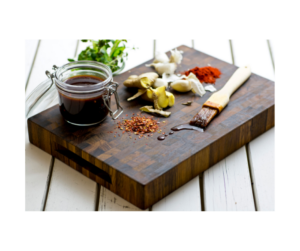Basic Marinades
go.ncsu.edu/readext?820936
en Español / em Português
El inglés es el idioma de control de esta página. En la medida en que haya algún conflicto entre la traducción al inglés y la traducción, el inglés prevalece.
Al hacer clic en el enlace de traducción se activa un servicio de traducción gratuito para convertir la página al español. Al igual que con cualquier traducción por Internet, la conversión no es sensible al contexto y puede que no traduzca el texto en su significado original. NC State Extension no garantiza la exactitud del texto traducido. Por favor, tenga en cuenta que algunas aplicaciones y/o servicios pueden no funcionar como se espera cuando se traducen.
Português
Inglês é o idioma de controle desta página. Na medida que haja algum conflito entre o texto original em Inglês e a tradução, o Inglês prevalece.
Ao clicar no link de tradução, um serviço gratuito de tradução será ativado para converter a página para o Português. Como em qualquer tradução pela internet, a conversão não é sensivel ao contexto e pode não ocorrer a tradução para o significado orginal. O serviço de Extensão da Carolina do Norte (NC State Extension) não garante a exatidão do texto traduzido. Por favor, observe que algumas funções ou serviços podem não funcionar como esperado após a tradução.
English
English is the controlling language of this page. To the extent there is any conflict between the English text and the translation, English controls.
Clicking on the translation link activates a free translation service to convert the page to Spanish. As with any Internet translation, the conversion is not context-sensitive and may not translate the text to its original meaning. NC State Extension does not guarantee the accuracy of the translated text. Please note that some applications and/or services may not function as expected when translated.
Collapse ▲ Marinating is an easy way to add great flavor to roasted meats and vegetables in no time! Use these basic marinades as guides to develop your own marinades with your favorite ingredients or ingredients you have on hand. There are literally thousands of marinade recipes, however, you really don’t need a recipe at all. A basic marinade is acid, oil, and seasoning, but there really are no hard, fast rules. Use your creativity! Keep in mind, the amount of time the food should marinate depends on the food. Beef and pork can be longer (up to 2 days) than chicken, vegetables, or tofu (a few minutes to several hours). Generally, fish is not marinated because it is too delicate. Firmer fish such as salmon or tuna may be marinated for a few minutes to ½ an hour.
Marinating is an easy way to add great flavor to roasted meats and vegetables in no time! Use these basic marinades as guides to develop your own marinades with your favorite ingredients or ingredients you have on hand. There are literally thousands of marinade recipes, however, you really don’t need a recipe at all. A basic marinade is acid, oil, and seasoning, but there really are no hard, fast rules. Use your creativity! Keep in mind, the amount of time the food should marinate depends on the food. Beef and pork can be longer (up to 2 days) than chicken, vegetables, or tofu (a few minutes to several hours). Generally, fish is not marinated because it is too delicate. Firmer fish such as salmon or tuna may be marinated for a few minutes to ½ an hour.
Try these delicious marinade options:
Marinade for Vegetables
Ingredients
- 4 tablespoons balsamic vinegar
- 4 tablespoons olive oil
- 1 teaspoon thyme
Directions
- Combine all ingredients in a bowl or sealable plastic bag.
- Add vegetables and marinate in the refrigerator.
Makes enough for 3-4 cups of cut vegetables
Marinade for Pork, Tofu, Salmon, or Tuna
Ingredients
- ½ cup soy sauce
- 1 tablespoon sesame oil
- 1 tablespoon ginger, grated (or 1 tsp ground ginger)
- Crushed red pepper to taste
Directions
- Combine all ingredients in a bowl or sealable plastic bag.
- Add meat and marinate in the refrigerator.
Marinade for Beef
Ingredients
- 4 tablespoons red wine vinegar
- 4 tablespoons olive oil
- 1 teaspoon oregano
- 1-2 cloves garlic, minced (optional)
Directions
- Combine all ingredients in a bowl or sealable plastic bag.
- Add beef and marinate in the refrigerator.
Makes enough for 1-1 ½ pounds of beef.
Marinade for Chicken
Ingredients
- ½ cup orange juice
- 4 tablespoons olive oil
- 1 tablespoon Dijon mustard
- 1 teaspoon thyme or oregano
Directions
- Combine all ingredients in a bowl or sealable plastic bag.
- Add chicken and marinate in the refrigerator.
Makes enough for 1-1 ½ pounds of chicken.



